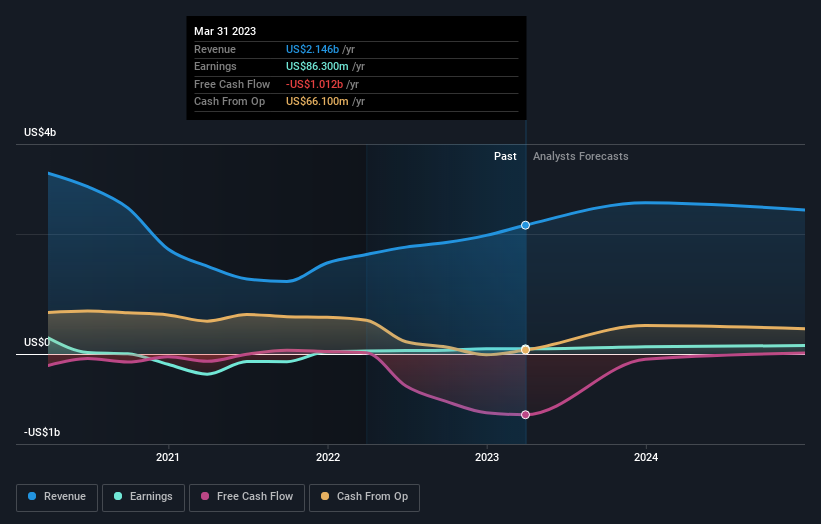In the wake of Trinity Industries, Inc.'s (NYSE:TRN) latest US$187m market cap drop, institutional owners may be forced to take severe actions
Key Insights
Institutions' substantial holdings in Trinity Industries implies that they have significant influence over the company's share price
A total of 4 investors have a majority stake in the company with 50% ownership
A look at the shareholders of Trinity Industries, Inc. (NYSE:TRN) can tell us which group is most powerful. We can see that institutions own the lion's share in the company with 88% ownership. That is, the group stands to benefit the most if the stock rises (or lose the most if there is a downturn).
And institutional investors saw their holdings value drop by 9.7% last week. The recent loss, which adds to a one-year loss of 12% for stockholders, may not sit well with this group of investors. Institutions or "liquidity providers" control large sums of money and therefore, these types of investors usually have a lot of influence over stock price movements. As a result, if the decline continues, institutional investors may be pressured to sell Trinity Industries which might hurt individual investors.
Let's delve deeper into each type of owner of Trinity Industries, beginning with the chart below.
Check out our latest analysis for Trinity Industries
What Does The Institutional Ownership Tell Us About Trinity Industries?
Many institutions measure their performance against an index that approximates the local market. So they usually pay more attention to companies that are included in major indices.
Trinity Industries already has institutions on the share registry. Indeed, they own a respectable stake in the company. This suggests some credibility amongst professional investors. But we can't rely on that fact alone since institutions make bad investments sometimes, just like everyone does. If multiple institutions change their view on a stock at the same time, you could see the share price drop fast. It's therefore worth looking at Trinity Industries' earnings history below. Of course, the future is what really matters.
Institutional investors own over 50% of the company, so together than can probably strongly influence board decisions. We note that hedge funds don't have a meaningful investment in Trinity Industries. Our data shows that BlackRock, Inc. is the largest shareholder with 17% of shares outstanding. With 14% and 12% of the shares outstanding respectively, Capital Research and Management Company and The Vanguard Group, Inc. are the second and third largest shareholders.
On looking further, we found that 50% of the shares are owned by the top 4 shareholders. In other words, these shareholders have a meaningful say in the decisions of the company.
While it makes sense to study institutional ownership data for a company, it also makes sense to study analyst sentiments to know which way the wind is blowing. There are plenty of analysts covering the stock, so it might be worth seeing what they are forecasting, too.
Insider Ownership Of Trinity Industries
While the precise definition of an insider can be subjective, almost everyone considers board members to be insiders. Management ultimately answers to the board. However, it is not uncommon for managers to be executive board members, especially if they are a founder or the CEO.
Insider ownership is positive when it signals leadership are thinking like the true owners of the company. However, high insider ownership can also give immense power to a small group within the company. This can be negative in some circumstances.
Our data suggests that insiders own under 1% of Trinity Industries, Inc. in their own names. Keep in mind that it's a big company, and the insiders own US$16m worth of shares. The absolute value might be more important than the proportional share. It is always good to see at least some insider ownership, but it might be worth checking if those insiders have been selling.
General Public Ownership
The general public-- including retail investors -- own 11% stake in the company, and hence can't easily be ignored. This size of ownership, while considerable, may not be enough to change company policy if the decision is not in sync with other large shareholders.
Next Steps:
It's always worth thinking about the different groups who own shares in a company. But to understand Trinity Industries better, we need to consider many other factors. Case in point: We've spotted 3 warning signs for Trinity Industries you should be aware of, and 2 of them are significant.
Ultimately the future is most important. You can access this free report on analyst forecasts for the company.
NB: Figures in this article are calculated using data from the last twelve months, which refer to the 12-month period ending on the last date of the month the financial statement is dated. This may not be consistent with full year annual report figures.
Have feedback on this article? Concerned about the content? Get in touch with us directly. Alternatively, email editorial-team (at) simplywallst.com.
This article by Simply Wall St is general in nature. We provide commentary based on historical data and analyst forecasts only using an unbiased methodology and our articles are not intended to be financial advice. It does not constitute a recommendation to buy or sell any stock, and does not take account of your objectives, or your financial situation. We aim to bring you long-term focused analysis driven by fundamental data. Note that our analysis may not factor in the latest price-sensitive company announcements or qualitative material. Simply Wall St has no position in any stocks mentioned.
Join A Paid User Research Session
You’ll receive a US$30 Amazon Gift card for 1 hour of your time while helping us build better investing tools for the individual investors like yourself. Sign up here

 Yahoo Finance
Yahoo Finance 

